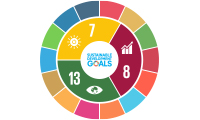Topic overview
The 2018 Sustainability Report, published on April 2, 2019, is our 22nd. It focuses on the key sustainability challenges we face and the many ways we are responding. It details our social, safety and environmental performance in 2018.
Topic selection
The topic selection process identifies the sustainability subjects that were most relevant to Shell and our stakeholders or were prominent globally in 2018.
Each year, we use a structured process to select the report’s content and confirm its validity. We engage with various groups and individuals to understand specific concerns about our business and its impact around the world, particularly in relation to the environment and society. We consider, among others, the views of our stakeholders such as non-governmental organisations, customers, the media, academics, investors and employees across our business. We gather opinions and advice in various ways including formal and informal meetings, workshops and online surveys.
This report lists the topics that were a priority to Shell in 2018. The topics that consistently ranked of higher importance were energy transition and climate change, as well as business ethics, transparency and corporate governance.
The main steps involved in selecting the topics are:
- identify and understand topics that are important to our stakeholders and our strategy;
- collate the topics identified as of high importance;
- identify the topics that will be covered elsewhere on www.shell.com;
- consider input from our Report Review Panel to ensure that coverage is balanced, relevant and complete; and
- inform Shell’s Executive Committee of the chosen topics, for their endorsement.
External voices
Several individuals have shared their views on Shell’s more significant activities in sections of the report called External voices. These quotes are intended to give independent perspectives on our activities. They come from a range of organisations in areas such as civil society, academia, contracting and supply, community leadership, as well as from customers and people living or working near our facilities. They also reflect some of the different regions where we operate and some of our various businesses and projects. Contributors are not remunerated for their quotes.
Reporting guidelines
We report in line with guidelines developed by IPIECA, the global oil and gas industry association for environmental and social issues. This report has also been prepared in accordance with the Global Reporting Initiative (GRI) Standards: Core option (see GRI index for full details).
We used the recommendations of the Task Force on Climate-related Financial Disclosures (TCFD) to guide and inform our reporting in our Annual Report and Sustainability Report, complemented by our Sky scenario and the Shell Energy Transition Report. The TCFD was set up by the Financial Stability Board, an international body, and its recommendations call on companies to provide greater transparency about how they identify, assess and manage climate-related risks and opportunities.
More detailed information about how we report is available at www.shell.com.
Index to topics in this Sustainability Report
Climate change and energy transition Page
- Access to energy
- Biofuels
- Carbon capture and storage
- Climate change and energy transition
- Distributed and household energy
- Electricity
- E-mobility
- Energy-efficient products
- Greenhouse gas emissions
- Hydrogen
- Lower-carbon energy
- Methane emissions
- Natural gas
- Nature-based solutions
- Net Carbon Footprint
- Solar
- Technology
- Wind
 Our people
Our people
 Sustainable development goals
Sustainable development goals
 About our data
About our data
 Electricity
Electricity